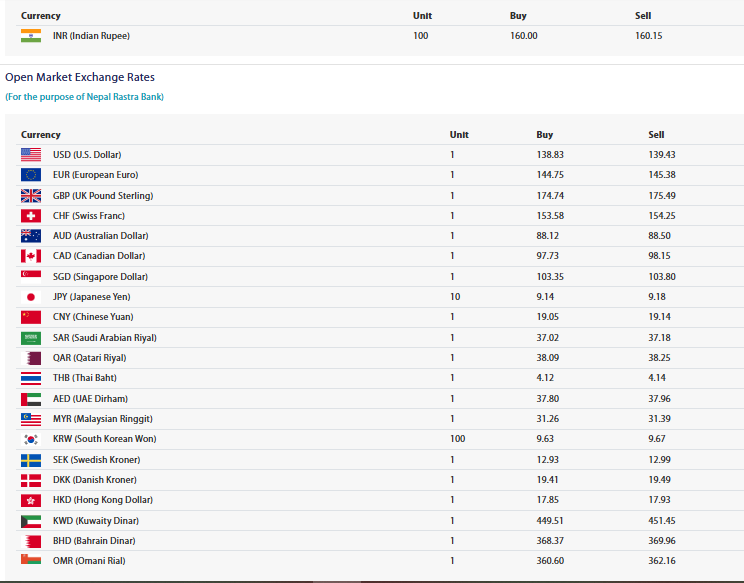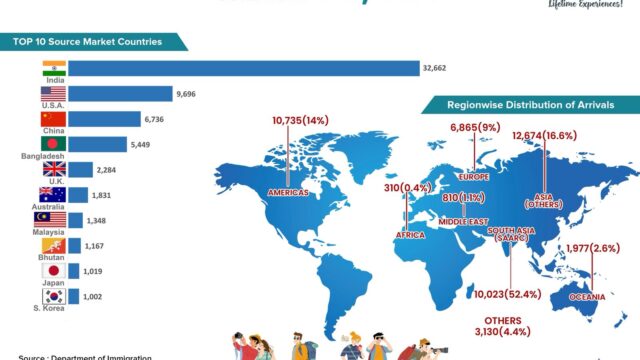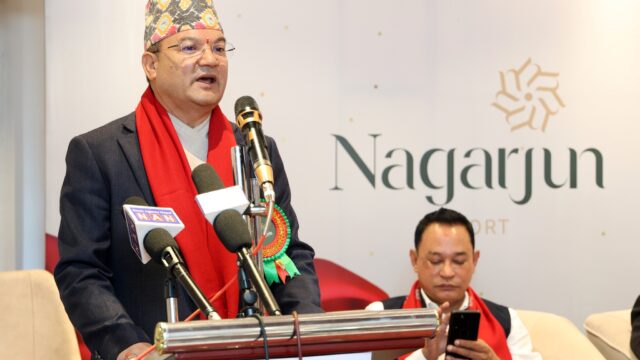Nepal Rastra Bank (NRB) has updated the open market exchange rates for various foreign currencies against the Nepalese Rupee (NPR). The Indian Rupee (INR), which holds significant economic importance for Nepal, is valued at NPR 160.00 for buying and NPR 160.15 for selling per 100 units. Meanwhile, the exchange rate for the U.S. Dollar (USD), a widely used global currency, stands at NPR 138.83 for buying and NPR 139.43 for selling per unit.
Among other major international currencies, the European Euro (EUR) is being traded at NPR 144.75 for buying and NPR 145.38 for selling. The UK Pound Sterling (GBP), known for its strong value, is set at NPR 174.74 for buying and NPR 175.49 for selling. Similarly, the Swiss Franc (CHF) holds an exchange rate of NPR 153.58 for buying and NPR 154.25 for selling.
For currencies from major economies in the Asia-Pacific region, the Australian Dollar (AUD) is available at NPR 88.12 for buying and NPR 88.50 for selling, while the Canadian Dollar (CAD) is priced at NPR 97.73 for buying and NPR 98.15 for selling. The Singapore Dollar (SGD), widely used in Southeast Asia, is being exchanged at NPR 103.35 for buying and NPR 103.80 for selling. The Japanese Yen (JPY), measured in 10 units, is valued at NPR 9.14 for buying and NPR 9.18 for selling, whereas the Chinese Yuan (CNY), an important trading currency for Nepal, is being exchanged at NPR 19.05 for buying and NPR 19.14 for selling.
Gulf region currencies, which are significant due to Nepal’s large migrant workforce, also saw updated rates. The Saudi Arabian Riyal (SAR) stands at NPR 37.02 for buying and NPR 37.18 for selling, while the Qatari Riyal (QAR) is being traded at NPR 38.09 for buying and NPR 38.25 for selling. The United Arab Emirates Dirham (AED), which is commonly used by Nepali migrant workers, is priced at NPR 37.80 for buying and NPR 37.96 for selling. Additionally, the Omani Rial (OMR) holds a strong exchange rate of NPR 360.60 for buying and NPR 362.16 for selling.

In the Southeast Asian currency market, the Thai Baht (THB) is being exchanged at NPR 4.12 for buying and NPR 4.14 for selling per unit. The Malaysian Ringgit (MYR) stands at NPR 31.26 for buying and NPR 31.39 for selling. South Korea’s currency, the Korean Won (KRW), is valued at NPR 9.63 for buying and NPR 9.67 for selling per 100 units.
European currencies apart from the Euro also saw updates in their exchange rates. The Swedish Kroner (SEK) is trading at NPR 12.93 for buying and NPR 12.99 for selling, while the Danish Kroner (DKK) is valued at NPR 19.41 for buying and NPR 19.49 for selling. The Hong Kong Dollar (HKD), which has relevance for trade and tourism, is set at NPR 17.85 for buying and NPR 17.93 for selling.
Among the premium Gulf currencies, the Kuwaiti Dinar (KWD) continues to hold its position as one of the strongest, with a buying rate of NPR 449.51 and a selling rate of NPR 451.45. Following closely behind, the Bahraini Dinar (BHD) is traded at NPR 368.37 for buying and NPR 369.96 for selling. These currencies play a crucial role in Nepal’s foreign exchange market, particularly due to the significant number of Nepali workers employed in Gulf countries.
The exchange rates, regulated by Nepal Rastra Bank, are essential for financial transactions, international trade, and remittance flows. Since Nepal relies heavily on imported goods and remittances from its overseas workforce, fluctuations in these rates can have widespread economic consequences. A stronger foreign currency can make imports more expensive, affecting the cost of goods and services within the country, while remittance earners benefit from favorable conversion rates.
Conversely, any depreciation in these currencies can influence Nepal’s trade balance and foreign exchange reserves. Businesses, travelers, and financial institutions closely monitor these rates, as even minor shifts can impact their expenses and earnings. Given this dependency, exchange rate stability remains a critical factor in maintaining Nepal’s economic balance and financial health.






